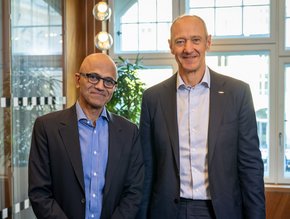Opinion: Reskill your workforce to navigate the new normal

Business leaders have found staying positive an increasingly challenging exercise whilst COVID-19 rips through our communities and economy fuelling a huge rise in unemployment and redundancy.
According to the Office of National Statistics, in the UK, more people were made redundant between July and September 2020 than at any point on record as the pandemic laid waste to large parts of the economy. In January, UK unemployment rose to 5%, the highest level in five years.
The good news is that, recently, there have been signs that the economy will rebound strongly, especially with the vaccine's continuing rollout. However, even with recovery looking better than expected, we have to acknowledge the hard facts around some of the roles caught up in the redundancy programmes. Many won't come back.
The amount of disruption combined with automation, digital transformations, and even changing customer expectations, will be sending some roles to the out-of-date pile.
So, what can business leaders do to mitigate the impact?
The easy answer is that business leaders need to not just think short term but start reskilling or upskilling their talent with a skill set that is going to be essential. But what exactly does that mean?
Right now, everyone is talking about reskilling or upskilling, but it can be increasingly complicated to understand what this means in practice and where to focus limited resources. Making sure the right choices are taken in this process will make a difference. It can be easy to focus on technical skills but in reality, as automation and the speed of digitalisation continues, other skills are actually becoming much more important.
The World Economic Forum has highlighted the critical skills for 2025 and beyond. The top five are as follows:
- Analytical thinking and innovation
- Active learning and learning strategies
- Complex problem-solving
- Critical thinking and analysis
- Creativity, originality and initiative
Internal entrepreneurship as a pathway for success
The fastest way to evolve a corporate to be ready for the future and build in the agility and speed that will help navigate the disruption is to empower teams in all areas of the business with these identified critical skills and the freedom to implement them. The challenge of reskilling and upskilling becomes how to instil these skills into an organisation at scale.
The answer for many is internal entrepreneurship as a pathway for success. Entrepreneurism has often been considered a bit of a dangerous tool at many businesses. With the standard approach of control, point and direct, this craft's unexpected nature can often seem at odds with the corporate way of life.
But what most organisations have learned or are learning the hard way is that today, due to the speed and impact of the disruption and change, it isn't just about acting like a startup, it's about operating like a startup. It's the only way to gain the flexibility and pace needed to succeed in today's world. And that means embracing entrepreneurship internally and the critical skill set that it builds.
When looking at how to implement this strategic imperative across your business fast, the most effective way is to tie it back into real life, learn-by-doing opportunity building moments that don't just share a concept but instil the mindset of startup thinking. Theory is not enough to embed the skills into your organisation. Attaching entrepreneurial startup thinking upskilling and reskilling programmes with your innovation programmes or new initiatives or product lines to build while you learn will give it the buy-in to take hold.
Product line or solution owners should be jumping at this approach. When 9 out of 10 products fail, internal entrepreneurial programmes are a unique approach that could reduce failure rates. They create space for these new skills to drive creativity and innovation to change the game. The impact can be limitless.
But it's not just about upskilling or reskilling. We know it’s often cheaper to use upskilling and reskilling rather than release and employing new staff. However, sometimes, as COVID-19 has shown, it becomes inevitable with our current business structures as they are. But what if you could extend how you manage your talent requirements with a startup outskilling programme to build in more flexibility and reduce the risk of forced redundancies?
Create a startup outskilling programme
Businesses could circumvent redundancies on mass and help their talent manage their careers by strategically moving people who choose into startup outskilling programmes. This approach quite possibly could make an impact on the unemployment figure and on those hardest hit.
Living your corporate values and acting responsibly, this approach increases the opportunity for success for everyone involved, from a buoyant economy rebound through programmes focused on solving industry issues, you will benefit from or even world problems. Organisations who approach talent management and skilling across the entire lifecycle with entrepreneurship opportunities would become the future beacons for rock start talents to join. Helping you hire not fire the best.
By exploring startup thinking and entrepreneurial programmes internally, organisations as a critical element of your reskilling, upskilling and even outskilling strategies can redefine the relationship between the business and their teams and improve chances for everyone to create value.
Finding and launching that next wave of profitable growth at pace while managing talent across their lifecycle will be the difference between those that take this time of disruption head-on and survive and those who are taken down by it.
Chris Locke is CEO of UK and Europe at Rainmaking, a global venture builder and innovation consultancy that has engaged with more than 80 of the Fortune 500 corporates over the last decade, and helps build and scale more than 850 startups through the world’s largest industry focused accelerator programme, Startupbootcamp. Rainmaker works in partnership with the world’s biggest companies to maintain and grow shareholder value, with a focus on executing true business transformation that protects the business legacy whilst creating a positive environmental and societal impact






